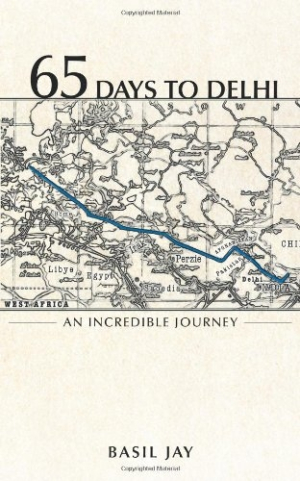65 Days to Delhi
An Incredible Journey
With Iran, Afghanistan, and Pakistan at the center of world news these days, Englishman Basil Jay has written a timely account of his 1974 “stupidly wonderful journey” through these countries in 65 Days to Delhi. Jay was then a young father in search of adventure, and he persuaded his wife, Polly, that the two of them should drive a van from France to India with their three young children in tow. Fortunately, Jay picked up new auto repair skills along the way to deal with many blown tires and other mechanical difficulties, and they fell in with a convoy of other Westerners for added safety during some dangerous routes. Though the trip was taken only forty years ago, the technological transformation of international travel in the intervening years makes the Jays’ experience seem as remote as a Victorian expedition.
The book consists of original diary entries from 1974 and hindsight comments. In effect, Jay restates just about everything that happened during his family’s journey, making for very repetitive reading. This bloated volume would be much easier to read if it were pruned by half: deleting the original diary entries, reducing the overly large font size, eliminating some overused descriptions of “kissy kissy” reunions with traveling partners, and removing many parenthetical asides that don’t add any information to the narrative. The humorous effect of repeating his Aussie comrades’ ever-present responses to any situation (“bloody stroll on” followed by “you got that right, mate”) also becomes tiresome after the third repetition.
Despite these flaws and the many grammatical and typographical mistakes strewn throughout its pages, 65 Days to Delhi is an absorbing account. The author has an enthusiastic style, using lively bits of description and dialogue to make vivid portraits of the scenery and people he encountered. Jay is a clever writer and often finds the humor in various cross-cultural exchanges, as when they bargain for coats in a Turkish bazaar, pantomime with petrol-pump operators in Iran, and survive a frightening imprisonment and shakedown in Afghanistan. His optimism about humankind never seems to flag: “Every mile you made was a misery of concentration. Every mile you made was a relief of success.”
Several pages of small, grainy photos are only marginally helpful in identifying some of the members of the traveling party, and since all of the men are slightly built and shaggily hirsute, it is difficult to differentiate among them.
While travel memoirs about touring Europe are fairly commonplace, this book provides a rare glimpse of life in pre-Revolutionary Iran, Russian-influenced Afghanistan, and other Middle Eastern and Asian countries where more wary travelers may have not dared to visit. Though some readers will wince at the idea of leaving shorts-clad Polly alone with the van in eastern Turkey (she had to fight off a crowd of would-be molesters), or at the effrontery of a caravan of strangers who think nothing of camping, picking fruit, and emptying their portaloos all around the countryside, Jay and his party enjoyed unusual luck during their travels. His family’s adventures are a fascinating snapshot of these countries at a crossroads in time.
Reviewed by
Rachel Jagareski
Disclosure: This article is not an endorsement, but a review. The publisher of this book provided free copies of the book and paid a small fee to have their book reviewed by a professional reviewer. Foreword Reviews and Clarion Reviews make no guarantee that the publisher will receive a positive review. Foreword Magazine, Inc. is disclosing this in accordance with the Federal Trade Commission’s 16 CFR, Part 255.

